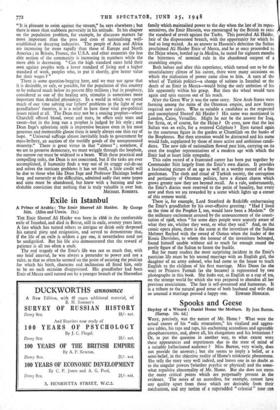Exile in Istanbul
A Prince of Arabia: The Emir Shereef All Haider. By George Stitt. (Allen and Unwin. 21s.) THE Emir Shereef All Haider was born in 1866 in the comfortable exile of Istanbul, and died in Beirut, still in exile, seventy years later. A fate which has turned others to intrigue or drink only deepened his natural piety and resignation, and served to demonstrate that, if the life of an exile is seldom a gay one, it nevertheless need not be undignified. But his life also demonstrated that the reward of patience is all too often a snub. The real tragedy of the Emir's life was not so much that, with one brief interval, he was always a pretender to power and not a ruler, as that so often he seemed on the point of securing the position for which his birth, character and inclination all fitted him, only to be on each occasion disappointed. His grandfather had been Emir of Mecca until turned out by a younger branch of the Shereefian family which maintained power to the day when the last of its repre- sentatives, the Emir Hussein, was encouraged by the British to raise the standard of revolt against the Turks. This provided All Haider, heir of the dispossessed branch, with the opportunity for which he had so long waited. As an answer to Hussein's defection the Sultan proclaimed All Haider Emir of Mecca, and he at once proceeded to the Hejaz where, bottled up in Medina, he tasted for eighteen months the bitterness of nominal rule in the abandoned outpost of a crumbling empire.
Both before and after this experience, which turned out to be the unsatisfactory climax of his career, there were many occasions on which the realisation of power came close to him. A turn of the wheel of Turkish politics—a change of sultans in Istanbul or the death of an Emir in Mecca—would bring the only ambition of his life apparently within his grasp. But then the wheel would turn again and spin success out of his reach.
After the Great War it was the same story. New Arab States were forming among the ruins of the Ottoman empire, and new States required new rulers. Who so suitable a candidate as the respected and unemployed Shereef All Haider ? His name was mentioned in London, Cairo, Versailles. Might he not be the answer for Iraq, for Syria, or, of course, for the Hejaz.? Or even, now that the last Sultan was an exile, for a restored Caliphate ? Eyes turned again to the courteous figure in the garden at Chumlijah on the banks of the Bosphorus. But then attention would be distracted and his name would fade, supplanted by those of more active and ambitious candi- dates. The new tide of nationalism flowed past him, carrying on its crest the tougher representatives of a modern age with which the Emir had at heart little sympathy.
This calm record of a frustrated career has been put together by Commander Stitt largely from the Emir's own diaries. It provides a fascinating picture of an age as well as a worthy record of a fine gentleman. The sloth and ritual of Turkish society, the corruption and pertinacity of Ottoman politics, have a distant charm which grows greater now they are beyond recall. As a rule, unfortunately, the Emir's diaries were reserved to the point of banality, but every now and then we are rewarded by a scene which lights up a corner of this remote world.
There is, for example, Lord Stratford de Redcliffe embarrassing the Emir's grandfather by his over-effusive greeting : " Had I lived in the time of the Prophet I, too, would have been a Moslem." Or the millenary excitement aroused by the announcement of the consti- tution of 1908, when "for some days people were scarcely aware of what they ate, whither they went, or what they said." And, on the comic opera plane, there is the scene at the investiture of the Sultan Mehmet Reched with the sword of Osman when the leader of the Konia Dervishes, to whom the honour of the investiture belonged, found himself unable without aid to reach far enough round the portly figure of the Sultan to fasten the buckle. But for many readers the most surprising incident in the Emir's patrician life must be his second marriage with an English girl, the, daughter of an army colonel, who had come to the house to teach English to the children of his first marriage. Miss Dunn (as she was) or Princess Fatmah (as she became) is represented by two photographs in this book. She looks out, as English as a cup of tea, on the strange world for which she was prepared to abandon all her previous associations. The face is self-possessed and humorous. It is a tribute to the natural good sense of both husband and wife that so unusual a marriage proved a happy one. EDWARD HODGKIN.






























 Previous page
Previous page